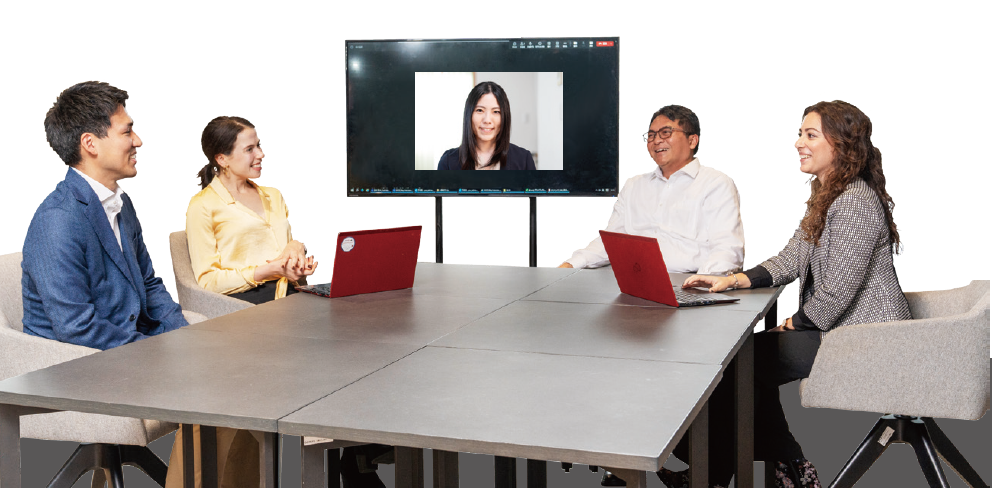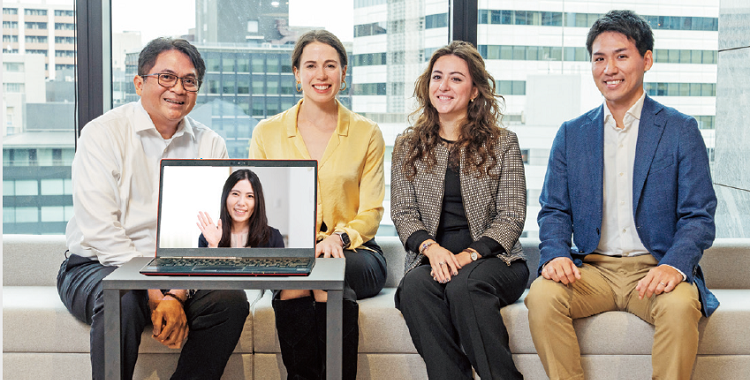Everyone at MUFG Bank has their own work philosophy, but how do these viewpoints change as we interact with others and grow? We talked with five individuals, three of who are on a short- or long-term placement in Japan and two of who are acting as mentors, about how their time working together has affected their personal MUFG Ways and how they hope to apply these experiences in their future work.
Profile
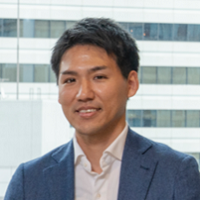
Kohei Kurihara
Global Digital Strategy Department, Digital Service Planning Division, MUFG Bank
(Mentor of Windu)
(Mentor of Windu)
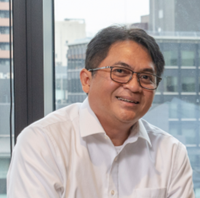
Wendi Winduwasono
Digital Product & Strategy, Adira Finance
(A participant of TIP and was enrolled at Global Digital Strategy Department, Digital Service Planning Division during the time.)
(A participant of TIP and was enrolled at Global Digital Strategy Department, Digital Service Planning Division during the time.)
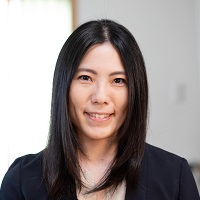
Sakuya Okada
Cross Border Corporate & Product Syndication Team, Syndication & Distribution Department, Solution Products Division, MUFG Bank
(Mentor of Vanessa)
(Mentor of Vanessa)
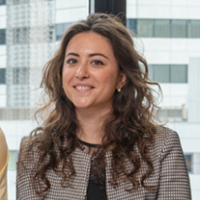
Vanessa Finelli
Capital Markets Solutions Group, Debt Capital Markets, MUFG Securities EMEA plc
(A participant of TIP and was enrolled at Cross Border Corporate & Product Syndication Team, Syndication & Distribution Department, Solution Products Division during the time.)
(A participant of TIP and was enrolled at Cross Border Corporate & Product Syndication Team, Syndication & Distribution Department, Solution Products Division during the time.)
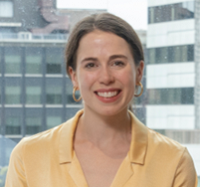
Annie Jacobs
Global Sanctions Compliance Department, Global Financial Crimes Division, MUFG Bank
(A participant of LTA)
(A participant of LTA)
Teamwork and Professionalism: The Spirit of the MUFG Way
First, please introduce yourselves and the kind of work you are doing here in Japan.
Sakuya: I joined MUFG Bank 11 years ago and have experience in project finance and loan syndication. My current role has me promoting Samurai loans to clients overseas and distributing them to the Japanese loan market. I am acting as Vanessa’s mentor during her time on TIP (Three-month Intensive Program).
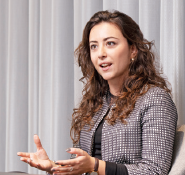
Vanessa: I am from Italy but have been working in the London office since graduating in 2020. I am currently working as part of the Capital Markets Solution Team, which covers hybrid bonds, liability management, and sustainable financing and oversees all corporate clients in EMEA (Europe, the Middle East, and Africa).
During my time on TIP, I have been working with Sakuya. We collaborate with local origination teams across EMEA and other regions to distribute loans to Japanese investors. There are also client-facing opportunities, in which we connect non-Japanese companies to investors in Japan by hosting overseas companies and organizing meetings with Japanese investors.
Kohei: I have been working at MUFG Bank since 2012. I collaborate with Grab Holdings as a leader of the Global Alliance Team and evaluate investees’ credit models as a member of the AI Credit Model Development Team. I am Windu’s mentor.
Windu: I work in Adira Finance, the subsidiary of Bank Danamon in Indonesia, focusing on automotive financing companies. My primary role is managing digital product strategy. I am here to study the existing credit model for the Digital Alliance group within MUFG Bank.
Annie : I am originally from Texas in the United States but work at the New York office. I joined MUFG Bank after finishing graduate school in 2019. As part of my long-term assignment in Japan, I am a liaison between the United States and Japan teams, providing expertise and knowledge that would normally require setting up an international call or meeting to acquire. I am generally doing the same work as I would in the home office but have also picked up a few extra tasks and am learning how processes work in Japan and about the regulatory environment.
During my time on TIP, I have been working with Sakuya. We collaborate with local origination teams across EMEA and other regions to distribute loans to Japanese investors. There are also client-facing opportunities, in which we connect non-Japanese companies to investors in Japan by hosting overseas companies and organizing meetings with Japanese investors.
Kohei: I have been working at MUFG Bank since 2012. I collaborate with Grab Holdings as a leader of the Global Alliance Team and evaluate investees’ credit models as a member of the AI Credit Model Development Team. I am Windu’s mentor.
Windu: I work in Adira Finance, the subsidiary of Bank Danamon in Indonesia, focusing on automotive financing companies. My primary role is managing digital product strategy. I am here to study the existing credit model for the Digital Alliance group within MUFG Bank.
Annie : I am originally from Texas in the United States but work at the New York office. I joined MUFG Bank after finishing graduate school in 2019. As part of my long-term assignment in Japan, I am a liaison between the United States and Japan teams, providing expertise and knowledge that would normally require setting up an international call or meeting to acquire. I am generally doing the same work as I would in the home office but have also picked up a few extra tasks and am learning how processes work in Japan and about the regulatory environment.
What is your home-office work culture like?
Windu: Recently, due to the COVID-19 pandemic subsiding, workers in Indonesia have been asked to return to the office. However, while management is happy to see everyone’s faces again, the office is young and wants to work remotely. To do this, we are working to gain the trust of management, as they believe working in the office raises productivity levels.
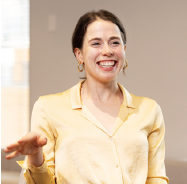
Annie: We are facing a similar situation in the United States. There are differing perspectives on what the most effective workstyle is particularly given the high cost of living and commuting. Part of the spirit of the MUFG Way includes teamwork and professionalism, so there has been a degree of dialogue between the management and employees of the global teams about how we can best maintain a workstyle approach that benefits both employees, management, and the company as a whole.
Vanessa: One of the biggest focuses of the London office have been on diversity and inclusion and creating an office that is open and comfortable for everyone to work in. We are trying to build a safe space and prioritize gender balance. There are quite a few women in my department, and I believe action is being taken to improve gender equality in management as well. As for the creation of a safe space, I feel safe speaking up when I disagree and confident that I can discuss any concerns with a manager or HR. That is not to say it always goes smoothly or that there aren’t exceptions, but the office is doing a good job of creating open conversation.
Vanessa: One of the biggest focuses of the London office have been on diversity and inclusion and creating an office that is open and comfortable for everyone to work in. We are trying to build a safe space and prioritize gender balance. There are quite a few women in my department, and I believe action is being taken to improve gender equality in management as well. As for the creation of a safe space, I feel safe speaking up when I disagree and confident that I can discuss any concerns with a manager or HR. That is not to say it always goes smoothly or that there aren’t exceptions, but the office is doing a good job of creating open conversation.
Getting Familiar with Japanese Work Culture and Building International Relationships
Why did you decide to work in Japan or to join the TIP program?
Windu: MUFG Bank has expanded a lot in Indonesia, so I decided to participate in the program because I knew it would be a good opportunity to gain experience about the Digital Strategic Group and to improve support from the Indonesian side. However, I had to pass an exam because Indonesia could only send one person.
Vanessa: I decided to apply for the TIP program after receiving an e-mail advertising it, and the process was quick for me. I filled out a form explaining why I wanted to come to Japan and then had a short interview with the Japanese team. MUFG Bank is a major Japanese institution with many locations around the world, sometimes making it hard to feel like I’m part of a Japanese corporation. This program provides a good opportunity to study Japanese culture. I was excited to learn and understand more about certain processes and why they are done the way they are. I believed this program would also be a personal and professional challenge for me as I would be going to the other side of the world and communicating with people of a different background.
Annie: I jumped at the opportunity to come to Japan on this long-term assignment because, at times, there can be a natural disconnect between our U.S. and Japan teams. This is unavoidable due to the time differences and the fact that most of our interactions exiting amongst delayed emails. So, the idea of being able to build relationships with our team in Tokyo was enticing. Immediately upon arriving here I felt a positive impact and have been enjoying the assignment ever since.
Vanessa: I decided to apply for the TIP program after receiving an e-mail advertising it, and the process was quick for me. I filled out a form explaining why I wanted to come to Japan and then had a short interview with the Japanese team. MUFG Bank is a major Japanese institution with many locations around the world, sometimes making it hard to feel like I’m part of a Japanese corporation. This program provides a good opportunity to study Japanese culture. I was excited to learn and understand more about certain processes and why they are done the way they are. I believed this program would also be a personal and professional challenge for me as I would be going to the other side of the world and communicating with people of a different background.
Annie: I jumped at the opportunity to come to Japan on this long-term assignment because, at times, there can be a natural disconnect between our U.S. and Japan teams. This is unavoidable due to the time differences and the fact that most of our interactions exiting amongst delayed emails. So, the idea of being able to build relationships with our team in Tokyo was enticing. Immediately upon arriving here I felt a positive impact and have been enjoying the assignment ever since.
The program sounds like it is full of great opportunities to learn more about the company. Speaking of which, what kinds of experiences have you had during your time here?
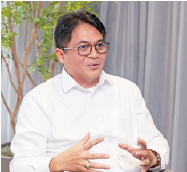
Windu: One of the biggest things I have noticed while here is how punctual everyone is. There are meetings held every day and everyone is very disciplined. I have also learned a lot from watching Kohei and reading different company documents. I’ve been fortunate to meet many people, including outsource parties, as the digital business in Tokyo is quite large, enabling me to take part in discussions I could not experience in Indonesia.
Vanessa: My experience somewhat resembles Windu’s. The Japanese team members are always precise and punctual. At first, I had trouble understanding why everything was done in such detail and on a set schedule, but I have now come to understand and want to bring this experience home with me. Internal meetings in London can sometimes be long and without a specific agenda, and materials an information on meetings are not always shared with large advance. Everyone doing their homework before going into a meeting helps to promote efficiency. Following the script too precisely has its cons, and there could be a bit more freedom. I think finding a balance between the two cultures would benefit the company.
Annie: That’s something I would like to share with my team back home as well. The pre-meeting meetings provide accountabilities for all stakeholders and are informative. I believe implementing something similar back home would help to reduce inefficiencies.
Vanessa: Sakuya has also helped me a lot during my time here. She was my first introduction to the country, and I had many questions about work and Japanese culture. She was patient and answered all of them, which was very beneficial during my first couple of weeks here. Through my interactions with her, I have learned to be clearer, patient, and just to embrace this unfamiliar culture.
Annie: While I don’t have a mentor, someone was often assigned to answer my questions. I never wanted to cause too much trouble, but it was nice to have someone I knew I could approach with questions about how to be a better worker and contribute better to the team. I have forged good relationships while over here and hope to maintain them after I return.
Vanessa: My experience somewhat resembles Windu’s. The Japanese team members are always precise and punctual. At first, I had trouble understanding why everything was done in such detail and on a set schedule, but I have now come to understand and want to bring this experience home with me. Internal meetings in London can sometimes be long and without a specific agenda, and materials an information on meetings are not always shared with large advance. Everyone doing their homework before going into a meeting helps to promote efficiency. Following the script too precisely has its cons, and there could be a bit more freedom. I think finding a balance between the two cultures would benefit the company.
Annie: That’s something I would like to share with my team back home as well. The pre-meeting meetings provide accountabilities for all stakeholders and are informative. I believe implementing something similar back home would help to reduce inefficiencies.
Vanessa: Sakuya has also helped me a lot during my time here. She was my first introduction to the country, and I had many questions about work and Japanese culture. She was patient and answered all of them, which was very beneficial during my first couple of weeks here. Through my interactions with her, I have learned to be clearer, patient, and just to embrace this unfamiliar culture.
Annie: While I don’t have a mentor, someone was often assigned to answer my questions. I never wanted to cause too much trouble, but it was nice to have someone I knew I could approach with questions about how to be a better worker and contribute better to the team. I have forged good relationships while over here and hope to maintain them after I return.
As participants, it sounds like you are having many good-quality experiences. What about Kohei and Sakuya? What have you learned from working with Windu and Vanessa?
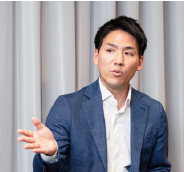
Kohei: Up until I moved to my current technology-related role, I had only had experience in business-related positions. I have very little experience in technology, so Windu has been helpful. MUFG Bank is exploring more business opportunities in technology, and he has insight into digital products and has given me advice on how to implement them, including which ones are difficult to introduce.
Sakuya: Our team consists of 12 Japanese members, so having Vanessa around has brought about big change. First, internal meetings are now held in English. As you can probably imagine, there is a range in fluency, so many of us were shy and struggled at first. However, after about a month of doing this, everyone has come to adjust. Secondly, Vanessa always speaks up and contributes to discussions, which I believe has brought energy to the team and had a positive impact.
Sakuya: Our team consists of 12 Japanese members, so having Vanessa around has brought about big change. First, internal meetings are now held in English. As you can probably imagine, there is a range in fluency, so many of us were shy and struggled at first. However, after about a month of doing this, everyone has come to adjust. Secondly, Vanessa always speaks up and contributes to discussions, which I believe has brought energy to the team and had a positive impact.
Communication is Key to Growing as a Global Corporation
I can see this exchange has had an impact on both sides, but how has this program affected your MUFG Way?
Vanessa: My MUFG Way is creating a safe space in which people can feel confident speaking up. If people aren’t joining the dialogue, they aren’t contributing to the team, so a safe environment is necessary if we want everyone to bring value to the company.
My experiences here have led me to see that a clear structure helps to create a safe environment because it lets everyone know what is expected of them. Being unsure of what is expected can cause uneasiness, so a clear structure can help to reduce some of the fear one may have. For example, an analyst can provide an idea or opinions without being expected to provide a final solution.
Annie: I wanted to bring a commitment to dynamism to Japan as I knew I was going to be experiencing a new culture, office, and people. Being open to change and quick to adjust while also taking time to pause and reflect has been beneficial. As Vanessa said earlier, coming here has been both a personal and professional challenge. Japan is very different from the United States and succeeding here helps me to feel ready to take on any other challenge.
I have also come to further realize the importance of consistent and precise communication. Things will always get lost in translation, and while inefficiencies can’t be avoided entirely, they can be mitigated by remembering to say things clearly, include a broader audience, and repeat important points multiple times.
My experiences here have led me to see that a clear structure helps to create a safe environment because it lets everyone know what is expected of them. Being unsure of what is expected can cause uneasiness, so a clear structure can help to reduce some of the fear one may have. For example, an analyst can provide an idea or opinions without being expected to provide a final solution.
Annie: I wanted to bring a commitment to dynamism to Japan as I knew I was going to be experiencing a new culture, office, and people. Being open to change and quick to adjust while also taking time to pause and reflect has been beneficial. As Vanessa said earlier, coming here has been both a personal and professional challenge. Japan is very different from the United States and succeeding here helps me to feel ready to take on any other challenge.
I have also come to further realize the importance of consistent and precise communication. Things will always get lost in translation, and while inefficiencies can’t be avoided entirely, they can be mitigated by remembering to say things clearly, include a broader audience, and repeat important points multiple times.
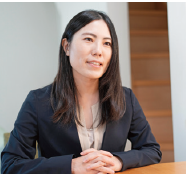
Sakuya: I agree with Annie. There are difficulties in communication, so trying to understand what someone wants to say, and their background is very important. My MUFG Way is to try and always be accepting of change and the different cultures around me. I often meet with clients and colleagues around the globe, so being aware of their cultural differences and careful when communicating is key.
Windu: Communication is vital to a global organization like MUFG Bank. Learning how Japanese people think and handle projects has contributed to reaffirming how important communication is. As for me, my MUFG Way is a spirit of continuous learning. I foresee many changes and new things happening in our future, so learning and keeping up with the latest trends are important.
Kohei: As others have previously mentioned, MUFG Bank is a large company. We have a strong trust and reputation globally. However, I want to be a person of value in the business without relying on that trust and reputation. If I rely on it too much, I will stop growing.
Windu: Communication is vital to a global organization like MUFG Bank. Learning how Japanese people think and handle projects has contributed to reaffirming how important communication is. As for me, my MUFG Way is a spirit of continuous learning. I foresee many changes and new things happening in our future, so learning and keeping up with the latest trends are important.
Kohei: As others have previously mentioned, MUFG Bank is a large company. We have a strong trust and reputation globally. However, I want to be a person of value in the business without relying on that trust and reputation. If I rely on it too much, I will stop growing.
Finally, how will you apply this change in thinking when you return to your home office?
Windu: Being a part of this program is an honor, so I want to give back to the company by sharing all the information and experience I have gained with those back home.
Annie: I feel I’m going to sound a bit like a broken record always referencing my time in Japan, but I hope to use my stories to build credibility. Based on my experiences, I will be able to explain why processes are done in a specific way, and although some people may not understand or agree, we should try to work with it rather than instinctively resisting. If something needs to change, we can work to revise it, but having a first person understanding of the current process, for example, is an important starting block.
Vanessa: I’m going to try being more diligent, paying more attention to detail, and being more patient. I feel everyone should take part in this program and experience it. We can all take the time to explain what our experiences were, but it’s difficult to comprehend what is being said if the listeners have not had similar experiences. So go somewhere, even if it’s not Japan. Be open to new experiences and challenge yourself.
Annie: I feel I’m going to sound a bit like a broken record always referencing my time in Japan, but I hope to use my stories to build credibility. Based on my experiences, I will be able to explain why processes are done in a specific way, and although some people may not understand or agree, we should try to work with it rather than instinctively resisting. If something needs to change, we can work to revise it, but having a first person understanding of the current process, for example, is an important starting block.
Vanessa: I’m going to try being more diligent, paying more attention to detail, and being more patient. I feel everyone should take part in this program and experience it. We can all take the time to explain what our experiences were, but it’s difficult to comprehend what is being said if the listeners have not had similar experiences. So go somewhere, even if it’s not Japan. Be open to new experiences and challenge yourself.
